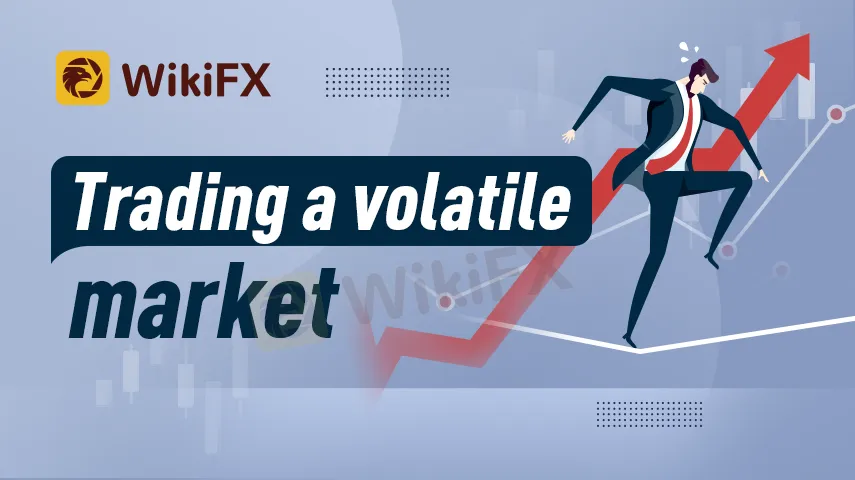简体中文
繁體中文
English
Pусский
日本語
ภาษาไทย
Tiếng Việt
Bahasa Indonesia
Español
हिन्दी
Filippiiniläinen
Français
Deutsch
Português
Türkçe
한국어
العربية
Trading a volatile market
Abstract:Volatile markets are ones where the price moves vigorously and unpredictably. Some commodities are more volatile in character than others but volatility is mainly a varying characteristic that affects all markets at different times.

Volatile markets are ones where the price moves vigorously and unpredictably. Some commodities are more volatile in character than others but volatility is mainly a varying characteristic that affects all markets at different times. To make money in the financial markets, there must be price movement. Fortunately, price movement is a constant in the markets, and one key factor is how rapidly prices are moving. The speed or degree of change in prices (in either direction) is called volatility.
As volatility increases, the potential to make more money quickly also increases. Higher volatility also means higher risk. When volatility spikes, it may be possible to generate an above-average profit, but you also run the risk of losing a larger amount of capital in a relatively shorter period of time.

When volatility increases, you should see wide ranges in price, high volumes and more trading in one direction – for instance, few buy orders when the market is tanking, few sell orders when the market is ramping.
Deeper analysis of market volatility suggests that there is a higher probability of a falling market when volatility is high, with lower volatility being more common in rising markets.
Nothing can make traders doubt their strategies more than market volatility. Once the price goes out of bounds, market participants might begin to question their approach and reconsider whether they should retain their open positions.
Always bear in mind that the biggest enemy of your portfolio is not volatility itself but your emotions. If you can‘t bear your portfolio taking a 30% or 50% hit during a volatile bear market, then you will indeed consider closing your positions. However, don’t forget that volatility is a short-term price instability, and, at some point, the prices of the assets in your portfolio will normalize.

With a disciplined approach, you may be able to manage volatility for your benefit—while minimizing risks. Here are five practical tips for trading a volatile market:
Manage risk - understand the risk on every trade you do. If you know the expected returns on each trade by knowing all the possible entries and exits, you are forced to systematically visualise and compare your trades
Stick to your plan – you should have a robust, well-defined strategy which you have tested in all market conditions. This should mean you do not jump into volatile markets, erratically ignoring your pre-defined rules.
Order types - always use a stop loss, as you will know the exact amount of risk you are willing to take on the trade before you enter it. Remember, “it‘s not the money you make that makes you a winning trader; it’s the money that you dont lose.”

Emotional control - volatile markets can influence traders to quickly abandon their plans and patience. Never let wishful thinking – known as confirmation bias – skew your thinking. You must have the discipline to accept the evidence and not react impulsively.
Educate yourself - no matter how experienced a trader may be, there is always room for improvement. This means doing your homework thoroughly, when the going is difficult as well as when trading seems easy. Reviewing your processes is also ongoing and non-negotiable.

Disclaimer:
The views in this article only represent the author's personal views, and do not constitute investment advice on this platform. This platform does not guarantee the accuracy, completeness and timeliness of the information in the article, and will not be liable for any loss caused by the use of or reliance on the information in the article.
Read more

✮Malaysia Event✮WikiFX Giveaway! Easy to Win RM150 Touch 'n Go eWallet reload PIN!
Do you know the truths about FX trading?Traders Need a Financial Background?Trading is Easy?You can’t be successful with a small trading account?A profitable trader wins most trades?You need to spend a lot of time monitoring trades?Expertise in economic analysis is important?Truth or Lie?Let’s discuss it and win our big giveaway!

Can The Market Really Trade Against You?
Have you ever seen price move against you as soon as you enter a trade?How about price hitting your stop loss levels before bouncing back up or down to your original profit targets?If you have, then congratulations! You’re just like every other trader out there.

Mentally Prepare for Full-Time Trading in 4 Steps
One of the more popular topics in the BabyPips.com forums is the possibility of making a living from trading. Believe it or not, there ARE traders who are making enough moolah from trading alone.

Finding a Reward-to-Risk Ratio That Works For You
“It’s not whether you’re right or wrong that’s important, but how much money you make when you’re right and how much you lose when you’re wrong.” – George Soros
WikiFX Broker
Latest News
How Crypto Trading Transforms FX and CFD Brokerage Industry
FCA Warns Against 10 Unlicensed or Clone Firms
CySEC Warns Against 14 Unlicensed Investment Websites
Top Currency Pairs to Watch for Profit This Week - March 31, 2025
Will natural disasters have an impact on the forex market?
Philippines Deports 29 Indonesians Linked to Online Scam Syndicate in Manila
Exposed: Deceptive World of Fake Trading Gurus – Don’t Get Fooled!
AI-Powered Strategies to Improve Profits in Forex Trading
Stock Market Trading Volume Drops by 97.58 Billion Naira This Month
Why does your mood hinder you from getting the maximum return from an investment?
Currency Calculator







